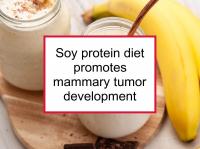The majority of protein bars and protein shakes intended for weight loss have either soy protein isolate or casein (milk protein) as their main ingredient. Soy protein isolate is produced by removing most of the fats and carbohydrates from defatted soy flour (which is made by grinding soybeans into a powder).
Soy protein has been shown to improve glycemic control in diabetic postmenopausal women and to improve insulin sensitivity in female monkeys whose ovaries have been removed.
Soybeans contain the isoflavones genistein and daidzein, which are phytoestrogens with estrogenic properties, including the potential to act in a chemopreventive manner. Although feeding soy protein isolate to female rats has been found in several studies to reduce carcinogen-induced mammary tumor development, other studies have reported contradictory findings. Now a new study presented at the 2020 Annual Meeting of the American Association for Cancer Research has reported that a soy protein isolate diet resulted in significantly higher rates of tumor development than a casein diet in obese mice. This is the first study to take into account the interaction between obesity and a soy protein diet.
Concerns about soy protein isolate
While many favorable studies concerning soy protein isolate have been published, concerns have been raised by some researchers:
- While rats fed a soy protein isolate diet had lower tumor incidence than rats fed a control diet in one study, the tumors had more invasive characteristics. For example, the tumors of animals on the soy protein diet had increased levels of HER-2/neu oncogene.
- Soy protein isolate stimulated estrogen positive (ER+) mammary tumor growth and increased uterine weight in ovariectomized mice in another study.
- Still another study reported that a high soy protein diet increased mitosis (leading to proliferation) in the mammary glands of rats. This was associated with increased estrogen receptor α (ERα) and decreased estrogen receptor β (ERβ) expression.
- A one-year study of the effects of soy protein isolate consumption in women found a stimulatory effect on the breasts of premenopausal women, characterized by increased secretion of breast fluid and the appearance of hyperplastic epithelial breast cells, as well as increased levels of plasma estradiol (E2).
- Soy protein has been shown to weaken the effects of tamoxifen treatment in premenopausal women with luminal A breast cancer.
Latest research finds soy protein increases tumors in obese mice
The study referenced above was designed to investigate the effects of a soy protein diet with high isoflavone levels in combination with obesity on circulating isoflavones, as well as the effect on mammary tumor development in a mouse model of breast cancer. To conduct the study, the authors used 45 obese and 54 lean female Zucker rats. Obesity has been shown to increase the susceptibility of Zucker rats to development of mammary tumors as a result of exposure to the carcinogen DMBA (7,12-dimethylbenz(a)anthracene).
Rats were assigned to one of four diet groups at six weeks of age: (1) lean, casein; (2) obese, casein; (3) lean, soy protein; and (4) obese, soy protein. All rats had free access to water and their assigned diets, with no calorie or feeding time restrictions. The carcinogen DMBA was administered to rats at age 50 days. The animals were weighed and examined manually for tumors twice per week and sacrificed 21 weeks after the DMBA treatment. Plasma was collected from each rat to measure genistein, daidzein, and equol levels. Equol, a non-steroidal estrogen with chemopreventive properties, is metabolized from daidzein in the gut. Equol has been shown to have the strongest binding affinities and estrogenic activities (especially for ERβ) among the isoflavone metabolites and has been hypothesized to be largely responsible for the estrogen-like activities of soy.
Among lean rats, 50% of the soy-fed animals developed mammary tumors compared to 69% of the casein-fed animals by the end of the experiment. However, among the obese rats, 76% of the soy-fed animals developed mammary tumors compared to only 15% of the casein-fed rats. Daidzein and genistein concentrations were comparable in the lean and obese soy-fed rats. However, equol concentration were significantly lower in the obese (compared to lean) soy-fed rats.
The authors conclude that obese rats fed a soy protein diet containing high isoflavone levels experienced greater tumor development in response to the carcingogen DMBA than obese rats fed a casein-based diet. In addition, the obese soy-fed rats had significantly lower plasma equol levels than the lean soy-fed rats. This reduction in circulating equal might have had a role in soy's impaired cancer chemopreventative effects in this obese breast cancer model, according to the authors.
Please see our soy protein isolate and genistein and daidzein pages for more information.
